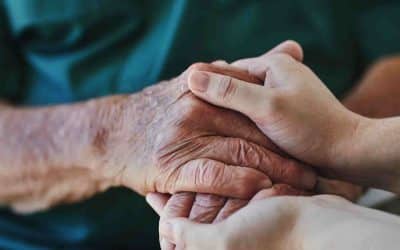Over the past several months in France, overwhelming evidence has been accumulating on the living and working conditions in the “EHPAD’s” (nursing home establishments for aged and dependent individuals): lack of resources, an exhausted nursing staff, patients’ suffering.
On January 30, 2018, in an unprecedented general strike, several tens of thousands of people rallied throughout France to denounce these living conditions. The strike mobilized both staff and managers of public and private nursing homes, all employee trade unions, patient associations and their families.
The EHPAD’s are chronically understaffed, and can no longer provide for the patients’ well-being (safety and dignity), because they are more numerous, and older, and need more care. In French nursing homes, the rate of caregivers per resident is 0.57, which is low compared to Northern European countries where this rate is one to one.
In addition, institutions are struggling to recruit caregivers. According to the National Health Insurance, the rate of work-related accidents and occupational illnesses are increasing (+ 2% in one year and + 45% over 10 years), especially a rise in lumbago or lower back pain. The average percentage rate is 9.4%, compared to 6% for construction workers. According to the parliamentary report submitted in September 2017, the absenteeism rate of “an average of 10%” is also troublesome and causes additional exhaustion for the working caregivers.
According to the French Directorate of Research, Analysis, Evaluation and Statistics (“DREES”). there were 728,000 elderly people attending or living in nursing homes in 2015. The parliamentary report specifies that the current population has evolved in recent years: “People entering nursing homes are over 85 on average, and the average stay is 2 ½ years […]. They present multiple pathologies, complications from chronic diseases, and some suffer from behavioral disorders…”
Launched more than ten years ago, the Solidarity Plan for the Elderly (2007-2012) was intended to make improvements in the quality of life in retirement homes, explore means of sustainable financing for those who lack self-sufficiency, and control costs for staying in an EHPAD … Even if more resources have been allocated for EHPAD’s in recent years, the means implemented are still inadequate. How can France better address this challenge of an aging population?
In addition, a pricing reform is being implemented in accordance with the December 28, 2015 law for adapting to aging, which provides for progressively aligning the allocations for public and private nursing homes from the year 2017 onward, until 2023. This very unpopular reform could represent a cut-back of 200 million Euros over 7 years to public nursing homes and could force staff reductions in many nursing homes, declares the French Hospital Federation (“FHF”). Nevertheless, the Health and Solidarity Minister, Agnès Buzyn, confirmed that the reform would continue. She announced that 100 million Euros would be provided by National Health Insurance budget to be allocated to the EPHAD’s and an additional 50 million Euros would be reserved for EPHAD’s facing difficulties (January 25, 2018 announcement).
With the increase in life expectancy, and consequently the aging of the population, the problems associated with an advanced age deserve a more in-depth analysis, as well as implementing sustainable long-term solutions. Caring for the elderly who are no longer self-sufficient is a major issue, one that not only concerns public authorities, but also families and society as a whole.
Ten year Strategy on Palliative Care : Disappointment and Concern
Ten year strategy on palliative care: Disappointment and concern 1.1 billion euros over 10 years for palliative care,...



